The Swiss firm that wants to power planes with green jet fuel
The Swiss company Synhelion is developing the world’s first industrial-scale plant to produce synthetic fuels from CO2, methane, water and sunlight. Swiss International Air Lines (SWISS) is on board with the initiative. But the long-term production challenges remain immense.
In September Synhelion, a spin-off from the federal technology institute ETH Zurich, started building a fuel plant at Jülich in northwest Germany to showcase its “sun-to-liquid” technology on an industrial scale (see video above).
The facility, known as DAWN, consists of a huge field of mirrors that tracks the path of the sun and reflects sunlight on a 20-metre tower. Inside, the solar radiation is concentrated at over 1,000°C to drive the thermochemical process that produces renewable fuel.
A reactor in the tower is fed with methane and carbon dioxide of biowaste origin from a local paper mill, as well as water. This is then processed into environmentally friendly versions of petrol, diesel or jet fuel using standard gas-to-liquids technology.
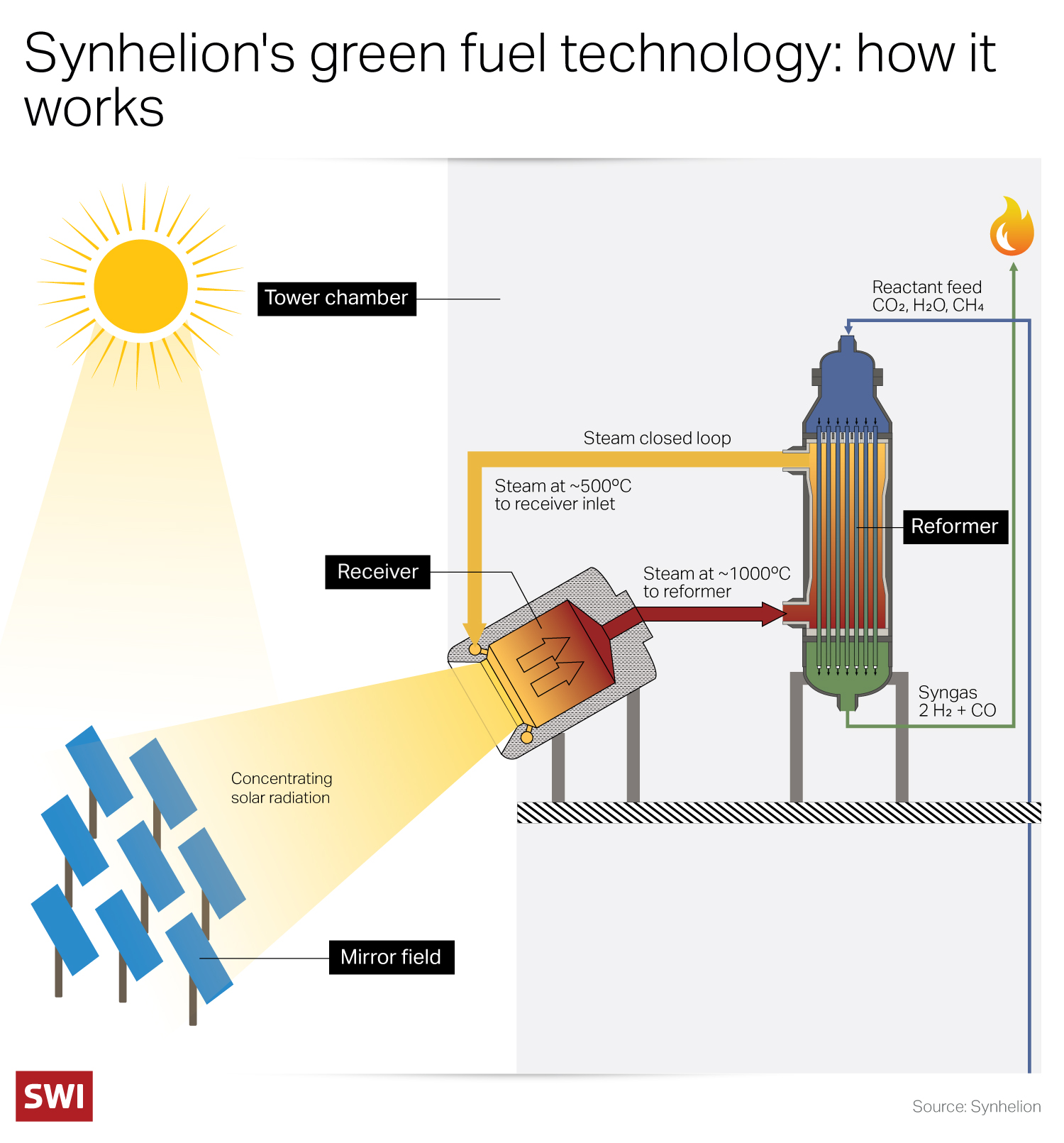
The production method was first demonstrated in 2019 in a mini refinery built at ETH Zurich. From next year, the Swiss entrepreneurs want to produce 10,000 litres of solar fuel a year at the new German plant. In parallel, Synhelion will start work on a much larger commercial plant in sunny Spain that can be operated continuously, increasing total production to 1.6 million litres a year from 2025.
Synhelion has even greater ambitions: it is already planning a target of 875 million litres a year for 2030 – half of Switzerland’s annual aviation fuel needs – and 50 billion litres a year in 2040. “We can easily multiply by ten or 20 the size and power of our reactor, after which we can multiply the amount produced,” says co-founder and CEO Philipp Furler. Yet the challenges of expanding production and the high costs involved are colossal.
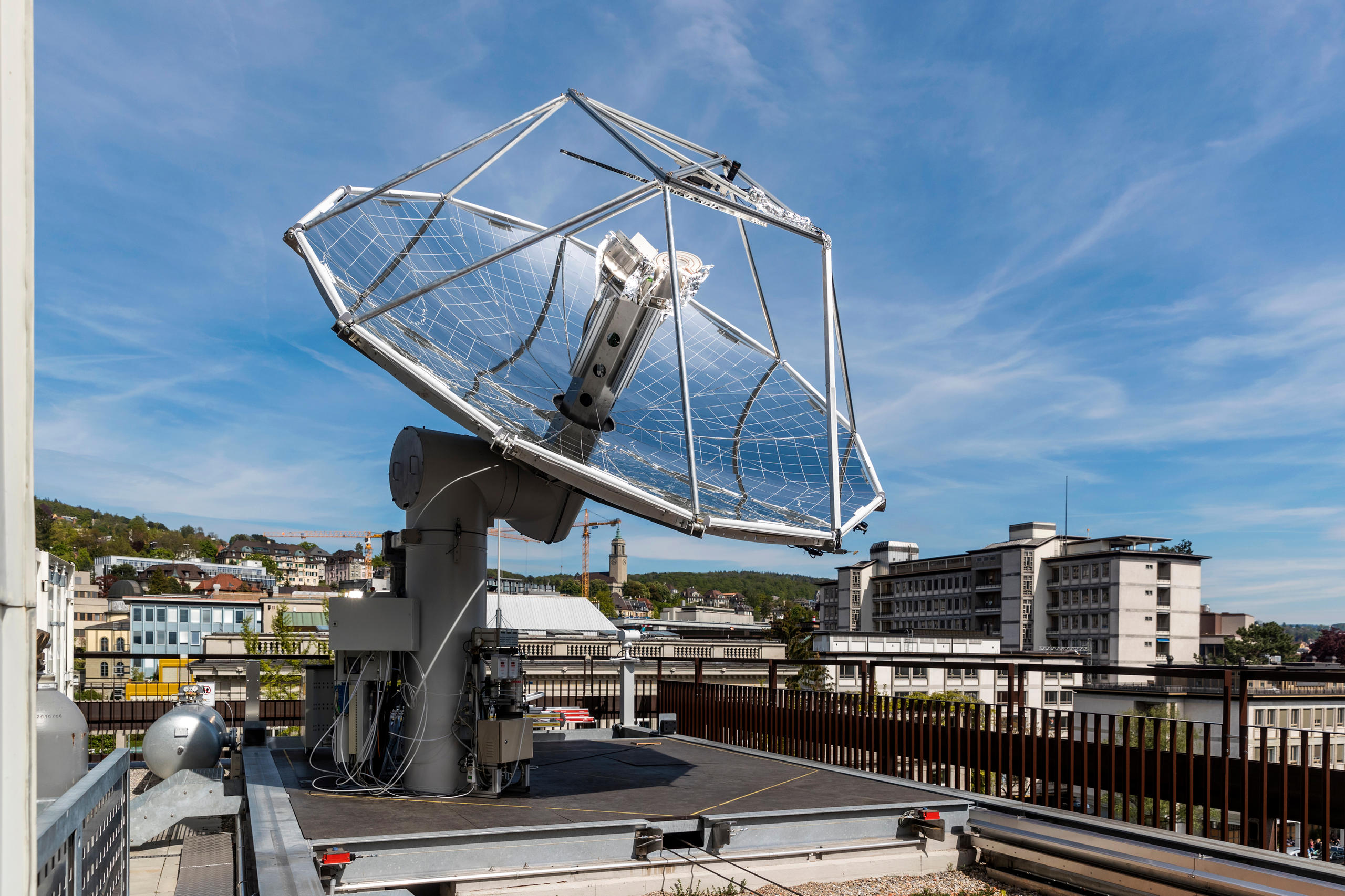
More
How sustainable fuels created from thin air could solve the energy crisis
Take off with SWISS planes
Synthetic jet fuel is currently four to eight times more expensive than normal kerosene. A study publishedExternal link in September in the journal Nature estimated that up to $2.1 trillion (CHF2.1 trillion) must be invested worldwide in sustainable aviation fuels (SAFs) and power infrastructure over the next 30 years to produce greater quantities and drive down the prices. SAFs produce up to 80% fewer carbon emissions than conventional fuel and are made from biomass (plants or waste) or recycled carbon.
Synhelion has already secured CHF37.5 million in funding, but it will need much more. It has the backing of the German government and major industrial partners, including the Lufthansa airline group and the Italian energy company ENI, as well as Zurich Airport and Switzerland’s largest automobile importer AMAG Group.
SWISS, part of the Lufthansa group, will be an early adopter. It wants to start mixing small amounts of Synhelion’s solar fuel with normal kerosene in its aircraft from 2023. Due to limited production capacity and high prices, “it’s not realistic to progress more quickly”, CEO Dieter Vranckx says.
The airline’s goal is to use 11% of sustainably sourced jet fuel to help slash CO2 emissions in half by 2030 and become climate-neutral by 2050.
Synhelion was an obvious choice for a partnership, explains Vranckx. “Solar fuels are much more sustainable and environmentally friendly than the existing biofuels,” he says.
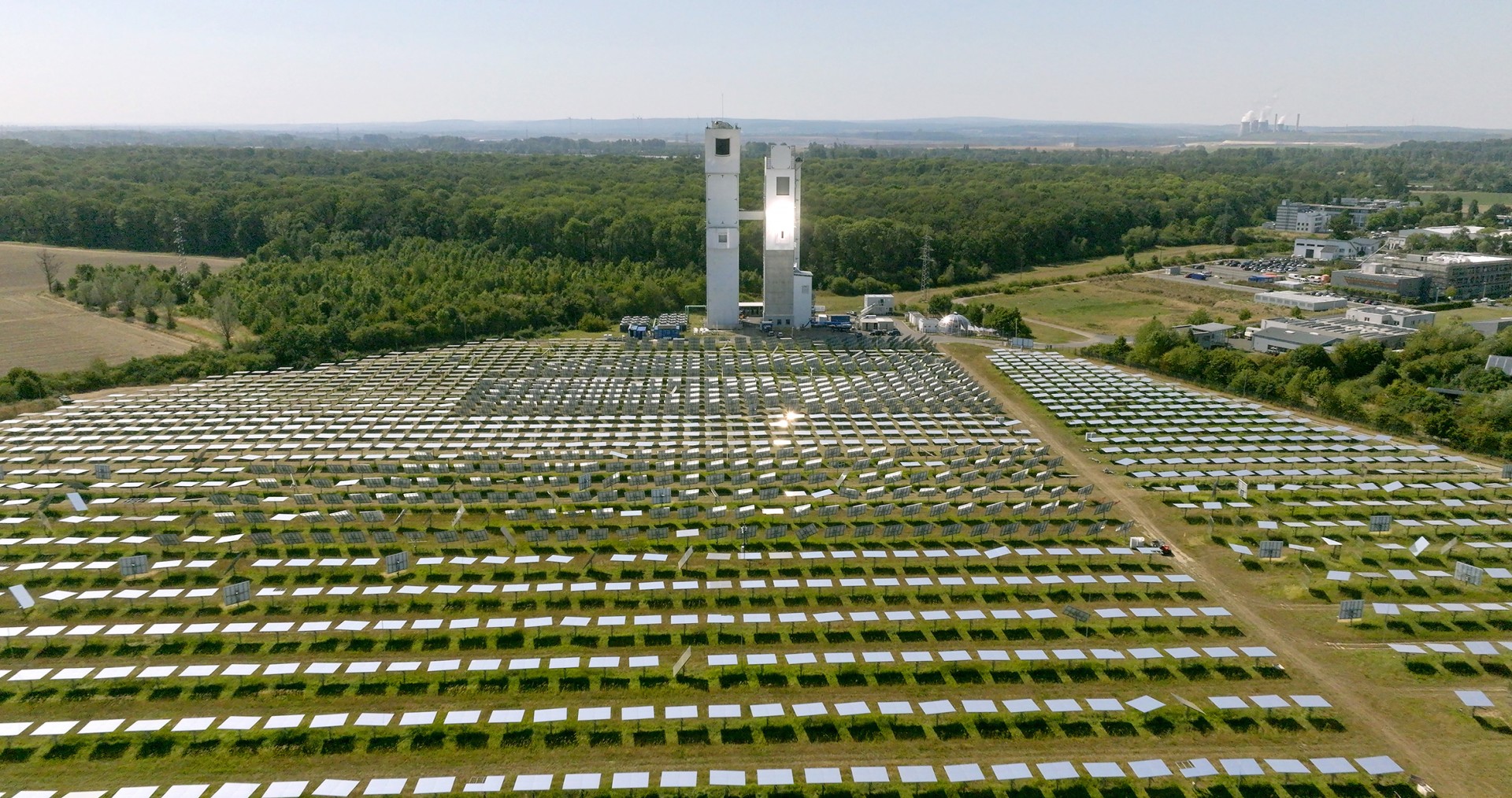
Climate experts, meanwhile, have given Synhelion’s initiative a more cautious welcome.
Georg Klingler, a campaigner at Greenpeace Switzerland, hailed the sun-to-liquid technology. But he questioned whether Synhelion’s solar fuel should be used as a priority by the aviation sector, which he said should have more ambitious plans to reduce CO2 emissions and rather focus on “sharply decreasing” air traffic.
Anja Kollmuss, an independent climate policy expert, also warned that synthetic fuels may not be as sustainable as the producers claim. “Synthetic fuels are carbon-neutral, but flying results in other effects on the climate like condensation trails. And these amplify the climate effect about three times more than CO2 alone,” she told Swiss public television, SRF.
Government support
Beyond private investors, scaling up production of SAFs will also require huge support from governments. In the United States, President Joe Biden’s administration has already announced tax credits and other incentives to aid the production of SAFs. Meanwhile, the European Commission, under its proposed RefuelEU Aviation regulation, wants member states to impose SAF targets at airports. The proposal currently being finalised suggests these would rise from 2% in 2025 to 85% by 2050.
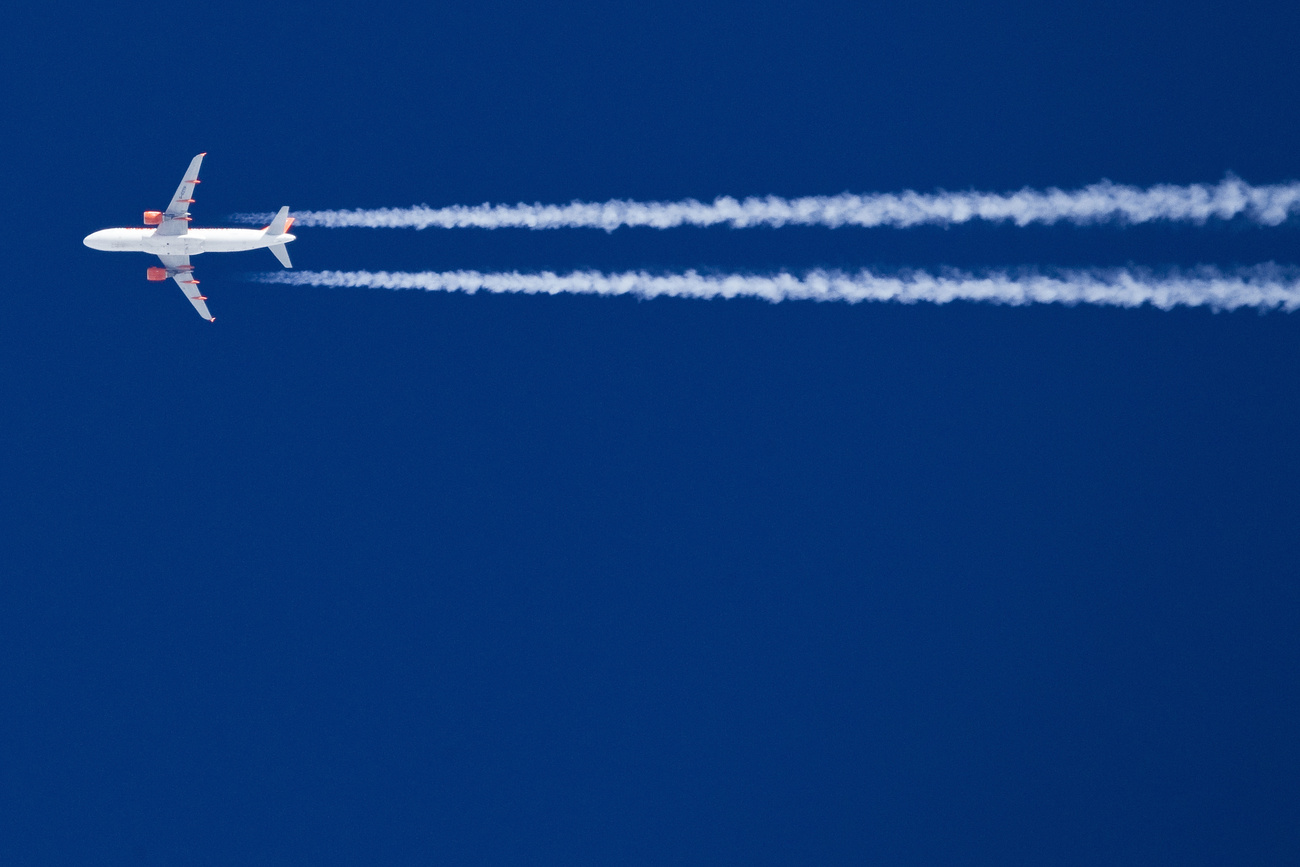
More
Fasten your seatbelt: aviation emissions are about to take off again
The Swiss government looks set to mirror this approach. Under the revised CO2 actExternal link, it has put forward various measures to reduce CO2 output by 2030. In line with the EU, from 2025 airlines refuelling in Switzerland must apply a blending quota to mix SAFs with conventional jet fuel. The government has also promised CHF25-30 million a year to support SAF producers.
Achieving sustainable fuel goals still looks like a long haul, but there appears to be real appetite for green aviation. It’s now up to specialist firms like Synhelion to deliver, says Geert De Cock, electricity and energy manager at the Brussels-based climate group Transport & Environment.
“If they do what they say they’re going to do, the company could cater for more than half of the projected fuel demand for European aviation in 2040 – that’s extraordinary,” he told SWI swissinfo.ch.
But for one company to scale up synthetic fuel production at that speed is very ambitious, he says. “The only way to guarantee Europe gets there is for policymakers to mandate clean jet fuels. The appetite for higher ambition is there. We need to make sure it is realised.”









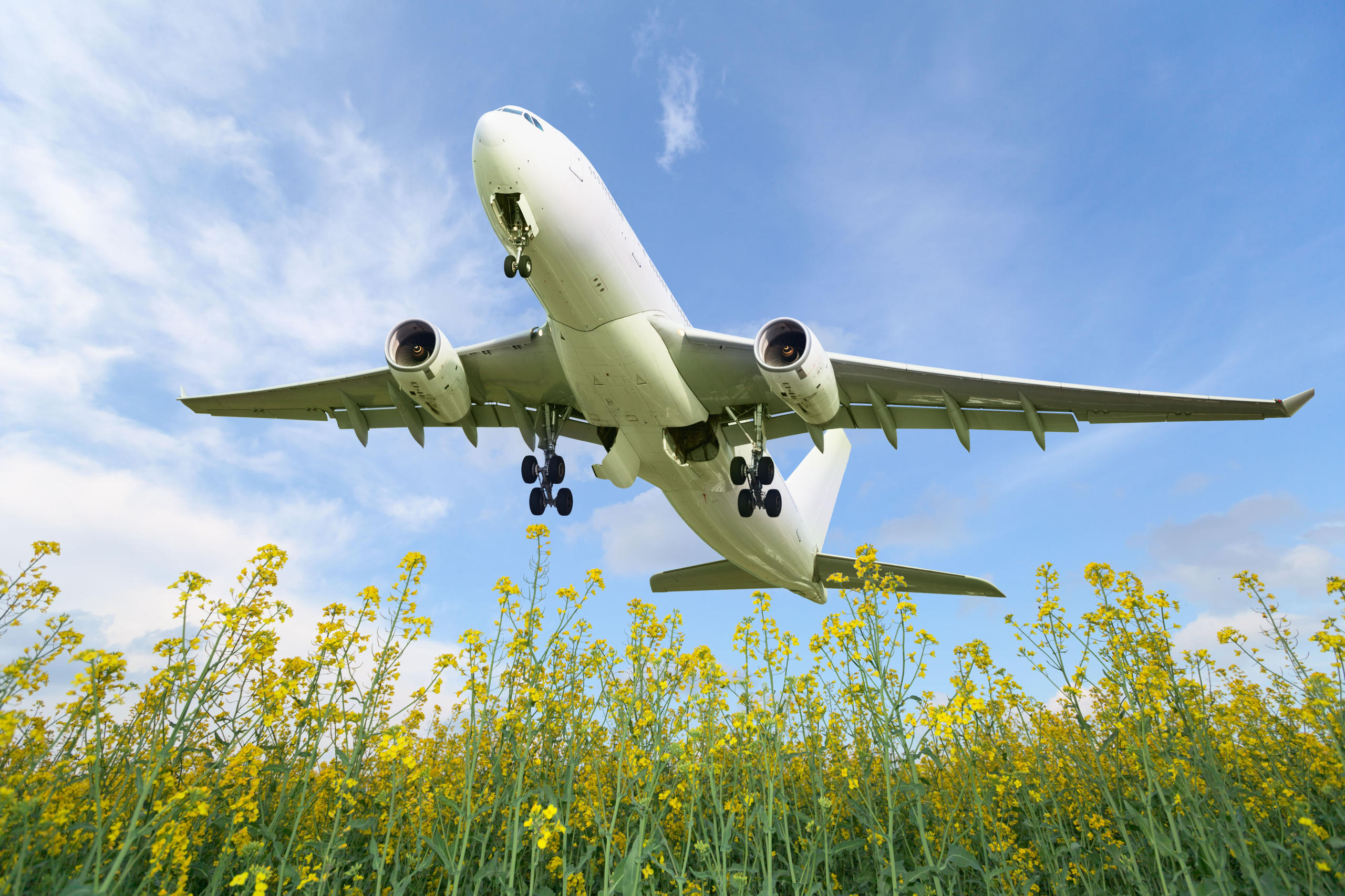
You can find an overview of ongoing debates with our journalists here . Please join us!
If you want to start a conversation about a topic raised in this article or want to report factual errors, email us at english@swissinfo.ch.